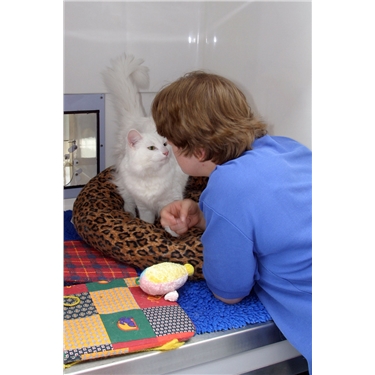(FIV) Feline Immunodeficiency Virus
23 July 2017

Where a cat is tested positive for FIV but is currently healthy, and with the agreement of our vets, we always try to find safe indoor homes for them. Many infected cats have years of normal life and good care and lots of love can help your FIV cat to enjoy a long life. So, if you are looking for an indoor companion please consider an FIV cat.
What is FIV?
FIV is a virus in cats that is similar to the human virus, HIV or Human Immunodeficiency Virus. However, FIV does not infect humans or other animals, and HIV does not infect cats.
How do cats catch FIV?
The virus is present in the blood, saliva and other body fluids of infected cats. It is very delicate and is unable to survive for long periods outside of the cat – so it cannot be transferred to other cats from your hands or clothes. Cats primarily pick up the virus through fighting – via bite wounds – or through mating behaviour, but it can also be passed from an infected female cat to her kittens.
Do all cats that get the virus become permanently infected?
Yes. A cat will produce antibodies, but these are ineffective and once a cat has FIV, they will be FIV positive for the rest of their life.
What are the signs of FIV?
There is an incubation period of months or even years when your cat may be perfectly healthy before signs of infection show. Many infected cats have years of normal life and may die from something else entirely before their FIV infection causes any problems.
Signs of FIV are varied but usually result from a weakened immune system and therefore a vulnerability to other infections. Once disease develops, infected cats may:
• become repeatedly ill eg with cat flu, sore gums, skin disease or digestive upsets
• simply seem ‘off-colour’ or have a high temperature
• take a long time to recover from infections
• lose weight
Is there any treatment for FIV?
There is currently no reliable treatment for FIV and it is not possible to predict if and when signs may develop. Vets will treat each FIV-positive cat individually, depending on the signs they develop, but treatment may involve:
• antibiotics and/or anti-inflammatory drugs as appropriate for secondary recurrent infections
• drugs that may help through direct anti-viral activity
• keeping infected cats indoors, with a good diet and ensuring they are fully vaccinated and regularly treated against fleas and worms. This will help to protect them from secondary infections, as well as help to prevent the spread of FIV to other cats. Cats Protection recommends that FIV-positive cats are kept indoors and only allowed outside in an impenetrable garden or safe run. They should not be allowed direct contact with FIV-negative cats.
Will I be able to put my FIV-positive cat in a boarding cattery?
Most catteries will accept FIV-positive cats if they are not showing other signs of infectious disease – aggressive, close contact is required for the virus to be transmitted. The virus is delicate and easily killed by disinfectants, therefore simple precautions and routine cleaning procedures will prevent transmission of the virus in the normal boarding environment, where cats are housed separately.
However, the immune systems of FIV-positive cats may be poor and infections caught while in a cattery could be more serious for them than for a FIV-negative one. If accommodation is available well away from other cats it may reduce the risk of your cat catching a secondary infection.